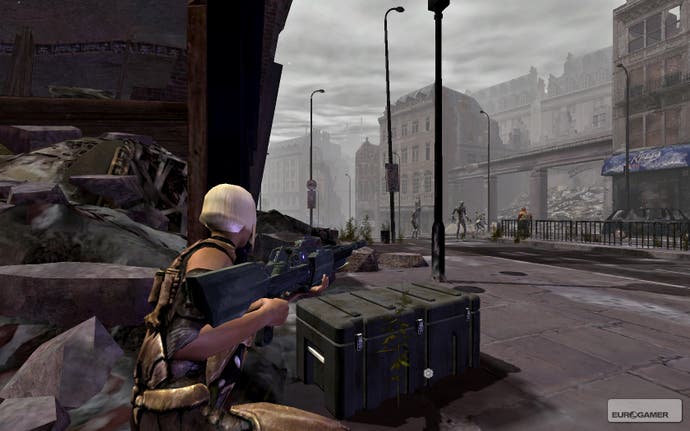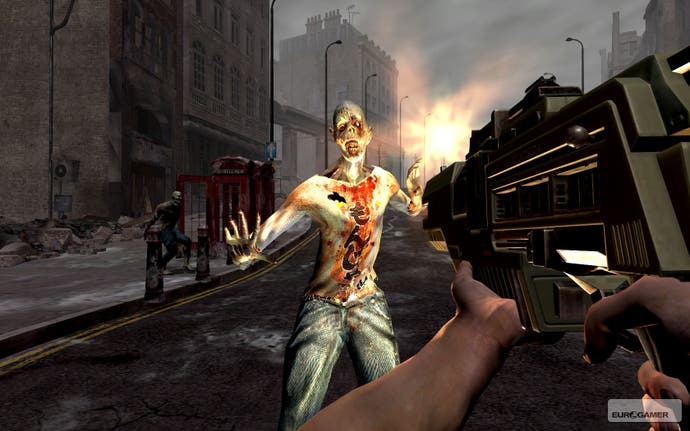Hellgate: London
Capital idea.
Unusually for a modern game - but altogether normally for a successor to the ARPGs of the nineties - Hellgate uses randomly generated levels, which change every time you play. We weren't entirely sold on this feature at the outset, to be perfectly honest, and we remain somewhat agnostic. Sure, it means that every player has a different experience of the game - but doesn't half the fun of a game lie in shared experiences?
Perhaps more importantly, it breaks the whole "London" subtitle of the game to have well-known areas of the city which are randomly generated rather than being modelled on reality. In Hellgate's defence, key landmarks are properly modelled rather than being left to chance - although for some reason most of them seem to be vastly smaller than in real life. One of the first you'll encounter is the British Museum, whose in-game model could be tucked neatly into a quiet corner of the real museum's Great Court.
We can certainly understand the argument for randomly generated levels in some of the game's online modes, since they provide (in theory) a wider range of experiences for players. However, when playing through the standard game, either single-player or online with friends, the random generation adds nothing - and takes away much.
It's sometimes embarrassingly obvious that you're playing a level designed by a random algorithm, not a talented human designer. More than once we've played through levels hunting for a number of objectives, only to discover that the map generator has plonked one of them down in the middle of the map, and then bunched the remaining two or three together right next to one another at the end of the map.
Mind the gap

Besides the simple fact that no map generation program is ever going to be as good as a human designer, the random maps introduce some other problems too. Hellgate's map generator has come on a long way since old randomly generated maps, which were very blatantly made up of repeating tiles. For the first few hours, in fact, you might not even notice that environments are repeating themselves more than you might like - but by the time you've opened up a few tube station bases (which serve as hub levels for a handful of dungeons), it will start to grate a bit.
That same room layout, that same pair of tunnels, repeated over and over in slightly different configurations... We don't doubt that Underground tunnels really are quite monotonous, but there's no need to inflict that on us in a videogame. It's bad enough having to go through them in packed train carriages, frankly.
Hellgate's redeeming features do earn it a good measure of forgiveness for the disappointing random maps. The game's six classes offer a huge amount of variety, for a start, and there are some rather unique types in there - such as the Engineer, who crafts mechanical minions and wields guns. Even the more familiar classes have certain interesting twists on their play style. The Guardian seems like a fairly standard tank at the outset, but an interesting mechanism actually allows him to boost his powers when surrounded by foes, which changes the rules of engagement rather significantly.

Each of the six classes is genuinely fun to play, which is rare enough in RPGs. Most players will probably settle on their preferred archetype pretty quickly, of course, but it's definitely good to see a game where you can roll just about any class, and be fairly confident that you won't be coming back to restart in disgust a few hours later.
The game's handling of loot and equipment is something of a mixed set of blessings. We were rather taken with the ability to apply multiple bonuses to your gear by sticking things like batteries, ammo clips and fuel pods into the available sockets on weapons - a concept which was pioneered in Diablo, but which is taken to a new level by Hellgate. Helpfully, the game also allows you to tear bonuses off your weapons at special machines in large tube stations, so you don't find yourself stuck in the awkward situation of having permanently applied a fantastic bonus to your sword, only to find a better sword in the next room.

.jpg?width=291&height=164&fit=crop&quality=80&format=jpg&auto=webp)






